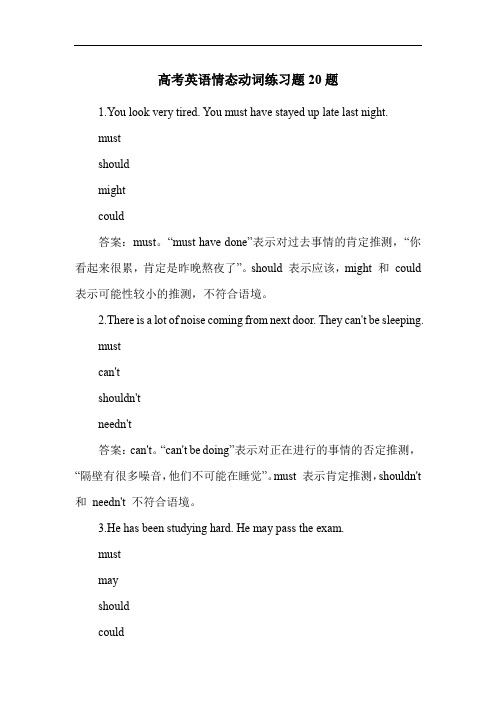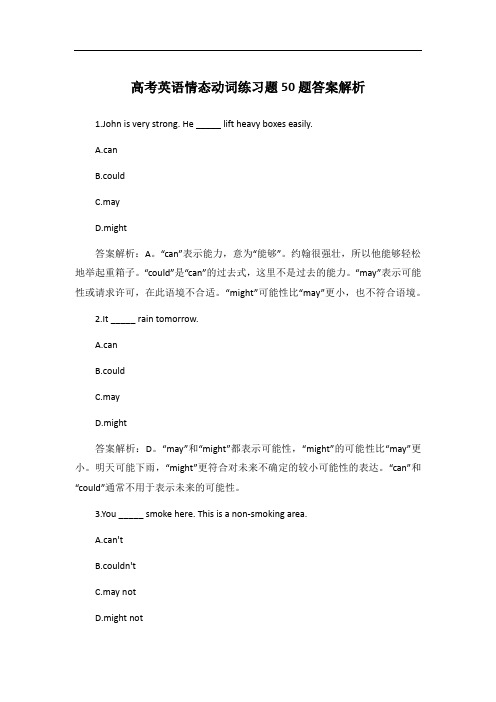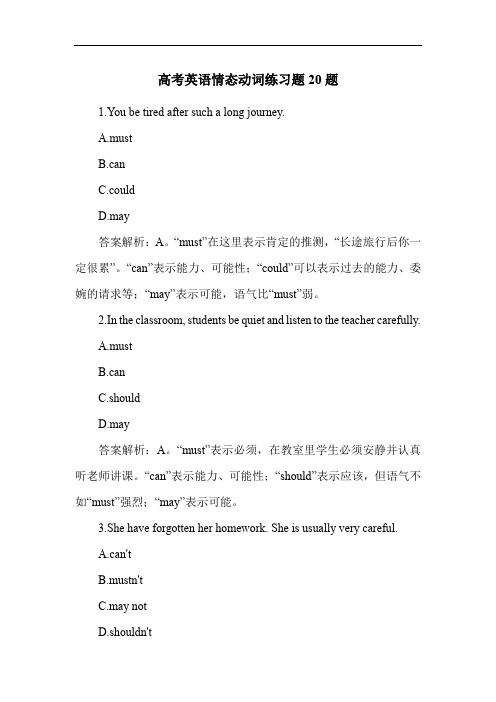高考情态动词专项练习题
高考英语情态动词练习题50题带答案解析

高考英语情态动词练习题50题带答案解析1.She ______ speak three languages when she was only ten.A.canB.couldC.mayD.might答案解析:B。
“could”表示过去的能力,句中“when she was only ten”表明是过去的时间,所以用“could”。
“can”表示现在的能力;“may”表示可能、许可;“might”表示可能性比“may”更小,且多用于虚拟语气等特定语境。
2.______ I borrow your pen?A.CanB.CouldC.MayD.Might答案解析:C。
“May I...?”表示请求许可,比较正式礼貌。
“Can I...?”也可表示请求许可,但语气稍随意;“Could I...?”语气更委婉;“MightI...?”可能性较小,且不常用在这种请求许可的语境中。
3.It ______ rain later. Let's take an umbrella.A.canB.couldC.mayD.might答案解析:D。
“may”和“might”都表示可能性,但“might”的可能性比“may”更小,根据“Let's take an umbrella.”可知不确定是否会下雨且可能性较小,所以用“might”。
“can”表示能力、许可或可能性,但在此语境不合适;“could”表示过去的能力或可能性,这里不是过去的情况。
4.You ______ be right, but I'm not sure.A.canB.couldC.mayD.might答案解析:C。
“may”表示有可能,句中“I'm not sure”表明不确定对方是否正确,可能性较大一些。
“can”表示能力、许可或可能性,但在此语境不合适;“could”表示过去的能力或可能性,这里不是过去的情况;“might”可能性比“may”更小。
高考英语情态动词练习题20题

高考英语情态动词练习题20题1.You look very tired. You must have stayed up late last night.mustshouldmightcould答案:must。
“must have done”表示对过去事情的肯定推测,“你看起来很累,肯定是昨晚熬夜了”。
should 表示应该,might 和could 表示可能性较小的推测,不符合语境。
2.There is a lot of noise coming from next door. They can't be sleeping.mustcan'tshouldn'tneedn't答案:can't。
“can't be doing”表示对正在进行的事情的否定推测,“隔壁有很多噪音,他们不可能在睡觉”。
must 表示肯定推测,shouldn't 和needn't 不符合语境。
3.He has been studying hard. He may pass the exam.mustmayshouldcould答案:may。
may 表示可能性,“他一直在努力学习,可能会通过考试”。
must 表示肯定推测,语气太强烈;should 表示应该;could 也表示可能性,但语气不如may 合适。
4.She said she would come. She ought to be here soon.mustought toshouldhave to答案:ought to。
ought to 表示应该,“她说她会来,她应该很快就到了”。
must 语气太强烈;should 也表示应该,但不如ought to 正式;have to 表示不得不。
5.You needn't bring an umbrella. It isn't going to rain.mustn'tneedn'tshouldn'tcan't答案:needn't。
高考英语情态动词练习题50题(答案解析)

高考英语情态动词练习题50题(答案解析)1.You be careful when crossing the road.A.mustB.canC.mayD.might答案解析:A。
“must”表示必须,过马路的时候必须小心,这是一种强烈的要求。
“can”表示能够,“may”表示可能,“might”表示可能性比“may”更小,这三个选项都不符合过马路要小心这个强烈的要求。
涉及的语法规则是“must”表示必须做某事。
2.She come to the party tonight,but I'm not sure.A.mayB.mustC.canD.will答案解析:A。
“may”表示可能,她今晚可能来参加派对,因为不确定。
“must”表示必须,语气太强烈;“can”表示能够;“will”表示将要,这三个选项都不符合不确定的语境。
涉及的语法规则是“may”表示可能性。
3.You finish your homework before you watch TV.A.mustB.canC.mayD.might答案解析:A。
“must”表示必须,先完成作业才能看电视,是一种规定。
“can”表示能够,“may”表示可能,“might”表示可能性比“may”更小,这三个选项都不符合规定的语境。
涉及的语法规则是“must”用于表示必须做某事。
4.He be very tired after a long day at work.A.mustB.canC.mayD.might答案解析:A。
工作了一整天后他肯定很累,“must”表示肯定的推测。
“can”表示能够,“may”表示可能,“might”表示可能性比“may”更小,这三个选项都不如“must”的推测强烈。
涉及的语法规则是“must”表示肯定的推测。
5.We take an umbrella.It might rain later.A.mustB.canC.mayD.should答案解析:D。
高考英语情态动词练习题50题(答案解析)

高考英语情态动词练习题50题(答案解析)1.You look very tired. You______have stayed up late last night.A.mustB.canC.shouldD.need答案解析:A。
“must”在这里表示肯定的推测,意为“一定”。
从“你看起来很累”这个语境可以推断出“你昨晚一定熬夜了”。
“can”表示能力或可能性,在此处不合适;“should”表示应该,不符合语境;“need”需要,通常用于否定句或疑问句。
2.I______speak French fluently when I was in college.A.canB.couldC.mayD.might答案解析:B。
“could”表示过去的能力。
“can”表示现在的能力;“may”和“might”表示可能性,不是能力。
3.You______play football in the street. It's very dangerous.A.mustn'tB.needn'tC.may notD.couldn't答案解析:A。
“mustn't”表示禁止,不允许在街道上踢足球,因为很危险。
“needn't”表示不必;“may not”表示可能不;“couldn't”表示过去不能。
4.______I borrow your pen?A.MayB.MustC.NeedD.Will答案解析:A。
“May I...?”表示请求许可,“我可以借你的笔吗?”“Must”表示必须,“Need”表示需要,“Will”表示将来或意愿,都不符合请求许可的语境。
5.The light is on. He______be at home.A.mustB.canC.shouldD.need答案解析:A。
“must”表示肯定的推测,灯亮着,所以他一定在家。
“can”表示能力或可能性,不太确定;“should”表示应该,不准确;“need”需要,不符合语境。
高考英语情态动词练习题50题答案解析

高考英语情态动词练习题50题答案解析1.John is very strong. He _____ lift heavy boxes easily.A.canB.couldC.mayD.might答案解析:A。
“can”表示能力,意为“能够”。
约翰很强壮,所以他能够轻松地举起重箱子。
“could”是“can”的过去式,这里不是过去的能力。
“may”表示可能性或请求许可,在此语境不合适。
“might”可能性比“may”更小,也不符合语境。
2.It _____ rain tomorrow.A.canB.couldC.mayD.might答案解析:D。
“may”和“might”都表示可能性,“might”的可能性比“may”更小。
明天可能下雨,“might”更符合对未来不确定的较小可能性的表达。
“can”和“could”通常不用于表示未来的可能性。
3.You _____ smoke here. This is a non-smoking area.A.can'tB.couldn'tC.may notD.might not答案解析:A。
“can't”表示不允许、禁止,这里是无烟区,所以不能吸烟。
“couldn't”是“can't”的过去式,这里不是过去的禁止。
“may not”和“might not”表示可能性的否定,不符合语境。
4.She _____ speak three languages.A.canB.couldC.mayD.might答案解析:A。
“can”表示能力,她能说三种语言。
“could”是“can”的过去式,这里不是过去的能力。
“may”和“might”表示可能性,不符合语境。
5._____ I borrow your pen?A.CanB.CouldC.MayD.Might答案解析:C。
“May I...?”表示请求许可,“can”也可用于请求许可,但语气比较直接,“may”更委婉。
高考英语情态动词练习题20题

高考英语情态动词练习题20题1.You be tired after such a long journey.A.mustB.canC.couldD.may答案解析:A。
“must”在这里表示肯定的推测,“长途旅行后你一定很累”。
“can”表示能力、可能性;“could”可以表示过去的能力、委婉的请求等;“may”表示可能,语气比“must”弱。
2.In the classroom, students be quiet and listen to the teacher carefully.A.mustB.canC.shouldD.may答案解析:A。
“must”表示必须,在教室里学生必须安静并认真听老师讲课。
“can”表示能力、可能性;“should”表示应该,但语气不如“must”强烈;“may”表示可能。
3.She have forgotten her homework. She is usually very careful.A.can'tB.mustn'tC.may notD.shouldn't答案解析:C。
“may not”表示可能不,“她可能没有忘记她的作业,她通常很细心”。
“can't”表示不可能;“mustn't”表示禁止;“shouldn't”表示不应该。
4.You be joking! That can't be true.A.mustB.canC.shouldD.may答案解析:A。
“must”在这里表示肯定的推测,“你一定是在开玩笑!那不可能是真的”。
“can”表示能力、可能性;“should”表示应该;“may”表示可能,语气比“must”弱。
5.We go to the park if it is sunny tomorrow.A.canB.mayC.mustD.should答案解析:B。
“may”表示可能,“如果明天天气晴朗,我们可能去公园”。
高中英语情态动词形式练习题40题含答案解析
高中英语情态动词形式练习题40题含答案解析1. I'm not sure if I can finish this assignment on time. It's very difficult.A. mustB. canC. shouldD. need答案解析:B。
A 选项“must”表示必须,与题意不符;C 选项“should”表示应该,也不符合语境;D 选项“need”表示需要,在这里不合适。
而题干中表达不确定能否按时完成作业,“can”表示能够,符合题意。
2. She may come to the party tonight, but I'm not sure.A. mustB. mayC. shouldD. need答案解析:B。
A 选项“must”表示肯定的推测,与题干中不确定不符;C 选项“should”表示应该,不合适;D 选项“need”表示需要,不恰当。
题干中说不确定她今晚是否会来派对,“may”表示可能,符合语境。
3. He could have done better in the exam if he had studied harder.A. mustB. couldC. shouldD. need答案解析:B。
A 选项“must”表示必须,与题意不符;C 选项“should”表示应该,也不合适;D 选项“need”表示需要,在这里不恰当。
题干中说如果他学习更努力,他本可以在考试中做得更好,“could”表示能够,符合语境。
4. We might go on a picnic this weekend if the weather is nice.A. mustB. mightC. shouldD. need答案解析:B。
A 选项“must”表示肯定的推测,与题干中不确定不符;C 选项“should”表示应该,不合适;D 选项“need”表示需要,不恰当。
高考(完整版)情态动词专题(练习题含答案)
高考(完整版)情态动词专题(练习题含答案)一、选择题1.A lot of online resources ________ be used either by teachers at school or parents at home. A.can B.should C.need D.must2.Don’t cross the road until the traffic lights turn green. A car_______hit you.A.need B.may C.should D.must3.Hurry up, or we ________ miss the beginning of the film.A.should B.must C.may D.have to4.—I must go to school today, ________?—No, you ________.You can go as soon as you get well.A.mustn’t I;needn’t B.needn’t I;needn’tC.mustn’t I;mustn’t D.need n’t I;mustn’t5.— Excuse me, could you tell me where the Nanjing Brocade Museum is?—Go along this road for five minutes. You ________ miss it. It’s a huge building. A.mustn’t B.can’t C.needn’t D.shouldn’t 6.—Will my car be ready by the end of the day?—I t ________ be, sir. I’ll call if there’s any problem.A.must B.could C.shall D.should7.— Is Lang Lang going to perform at Art Center this Friday?— Yes. It ________ be him. He has been here for three days.A.might B.must C.mustn’t D.may8.When you visit a museum, some instructions should ________ and we’d better not ________ them.A.pay attention to; be against B.be paid attention; againstC.be paid attention to; against D.be paid attention to; be against9.You ________ be careful with the camera. It costs!A.can B.will C.should D.may10.— Mom, must I clean my room now?— No, you ________. You can do it after dinner.A.needn’t B.mustn’t C.shouldn’t D.can’t11.We teenagers ________ have dreams. With dreams and hard work, anything amazing________ be created.A.may; can B.might; should C.should; can D.must; has to 12.—Have you decided to take up teaching as career after graduation?—I ________ go abroad for further education instead. But it depends.A.must B.should C.may D.shall 13.Please don't make so much noise. I ________ hear the speaker very well.A.needn't B.can't C.shouldn't D.mustn't 14.—The high school entrance examination is coming!—Yes, our teacher tells us we _______ be too careful while taking exams.A.mustn't B.shouldn't C.needn't D.can't15.You ______ pay too much attention to your pronunciation, as it is so important in the oral (口头的) test.A.shouldn’t B.mustn’t C.can’t D.needn’t 16.—Would you please________in that way? That’s not safe!—Sorry. I won’t do it any more.A.not driving B.not to drive C.no driving D.not drive 17.Dr. Zhong Nanshan once said, "To prevent the spread of this disease, we________never be too careful."A.can B.may C.must D.should18.—Will your mother be at home this Saturday?—Hard to say. She _______go to the countryside to see my grandparents.A.must B.may C.can D.would19.Think twice before making a decision, or you __________ get into trouble.A.may B.can't C.shouldn't D.mustn't20.I ________ hear you clearly. Would you please repeat it?A.mustn’t B.can’t C.needn’t D.shou ldn’t 21.Look at the floor, Tom! ________ you watch TV while having a meal?A.Should B.Could C.Must D.May22.You _________ smoke here! Look at the sign. It says "No smoking".A.needn't B.mustn't C.can D.may23.— Listen! Tom ________ be listening to the music while doing his homework.—Let’s go upstairs to remind him to turn it off.A.should B.could C.would D.must24.—Will Jim come to Yangzhou for a holiday?—He ________come and it depends on how much homework he will have.A.may B.should C.must D.need25.—In China, many parents complain that their children have to stay up late to do the homework.—Don’t worry. The government has realized the problem. I’m sure there ________ be good news soon.A.can B.should C.need D.must26.I think all the students love the weekends because, to them, they ________ get up early on Saturdays or Sundays.A.mustn’t B.don’t need C.needn’t D.can’t27.When people are waiting at the zebra crossing, cars and buses ________ wait and let them go first.A.must B.may C.can D.need28.—Shall I tell him the change of the time right now?—I’m afraid you ________, otherwise he will be late for the meeting.A.can B.may C.must D.need29.It’s of great importance to protect the environment. Each of us ________ take an active part in it.A.can B.may C.would D.should 30.—Must we stop the Japanese government discharging nuclear waste water (排放核污水) into the Pacific Ocean?—________. Because everyone should protect our earth and it is bad ________ us to eat the polluted seafood and drink the waste water.A.Yes, we can; of B.No, we mustn’t; of C.Yes, we must; for D.No, we needn’t; for 31.According to the rule, used batteries ________ be dropped in the red bin for harmful wastes. A.may B.would C.should D.might32.Cars ________ give way to walkers on some roads in Binhai, or the drivers will be fined. A.may B.will C.can D.must33.Mr. Black ________ be at home now. He went abroad on vacation last Friday.A.can’t B.mustn’t C.needn’t D.shouldn’t 34.—How beautiful the winter jasmines (迎春花) are!—Yes. These golden-yellow flowers ________ be widely seen in my city in March.A.must B.can C.would D.should35.— What do you think of the show yesterday?— Some of them were really good but others ________ be better.A.will B.must C.need D.can 36.—Who’s the man over ther e? Is that Mr. Black?—It ________ be him. Mr. Black is much taller than that man.A.may B.must C.can’t D.mustn’t37.—________ I see your ID card? We have to check your personal information.—Sure. Here you are.A.May B.Need C.Should D.Must38.—I don’t care what people think.—Well, you _______ . Some opinions are worth weighing.A.should B.might C.could D.would39.—I think they are enough. We ________ make so many chairs.—I don’t think so. Because nearly a quarter of them need ________.A.don’t need to; mending B.needed; to be mendedC.don’t need; mend D.need; to mend40.—Seventy dollars for such a dress! You ________ be joking!—I’m serious. It’s made of silk from Hangzhou.A.must B.need C.will D.can【参考答案】一、选择题1.A解析:A【详解】句意:很多在线资源既可以供学校的老师使用,也可以供家长在家使用。
高中英语情态动词形式练习题40题含答案解析
高中英语情态动词形式练习题40题含答案解析1.You come to the party tonight if you finish your homework.A.canB.couldC.mayD.might答案解析:A。
“can”表示有能力或有机会做某事,在这里表示如果你完成作业就有机会来参加今晚的派对。
“could”和“might”语气较委婉,“may”通常表示可能性。
在这个语境中,强调有能力和机会,用“can”最合适。
2.She pass the exam if she studies hard.A.canB.couldC.mayD.might答案解析:A。
同样,这里强调如果她努力学习就有能力通过考试,“can”表示能力。
“could”“might”语气委婉,“may”表示可能性,这里突出能力,所以选“can”。
3. you help me with this math problem?A.CanB.CouldC.May答案解析:B。
这里用“could”表示委婉地请求,“can”语气较直接,“may”和“might”在这个语境中不太符合请求的语气。
4.I ask you a question?A.CanB.CouldC.MayD.Might答案解析:C。
“may”用于请求许可比较正式,“can”也可以用于请求但相对不那么正式,“could”和“might”语气委婉但在这里不太符合直接请求的语境。
5. he come to school late today?A.CanB.CouldC.MayD.Might答案解析:D。
“might”在这里表示对可能性的较小推测,他今天有可能会迟到吗?“can”和“could”通常不用于这种较小可能性的推测,“may”也不太符合这个语境。
6. you lend me your pen?A.CanB.CouldD.Might答案解析:B。
“could”表示委婉地请求借笔,“can”语气较直接,“may”和“might”不太符合请求借东西的语境。
高考英语情态动词练习题30题
高考英语情态动词练习题30题1.She __________ speak five languages fluently.A.canB.mayC.mustD.should答案解析:A。
“can”表示能力,“她能够流利地说五种语言”。
“may”表示可能性或请求许可;“must”表示必须;“should”表示应该。
这里强调的是她具有说五种语言的能力,所以选A。
2.__________ I borrow your pen?A.CanB.MayC.MustD.Should答案解析:B。
“May I...?”是表示请求许可的常用句型。
“Can I...?”也可表示请求许可,但语气比“May I...?”稍弱;“must”表示必须;“should”表示应该。
这里表示委婉地请求借用钢笔,所以选B。
3.He __________ be at home. I just saw him leave.A.can'tB.mustn'tC.shouldn'tD.needn't答案解析:A。
“can't”表示不可能,根据后句“我刚看到他离开”可知他不可能在家。
“mustn't”表示禁止;“shouldn't”表示不应该;“needn't”表示不必。
所以选A。
4.You __________ study hard if you want to pass the exam.A.canB.mayC.mustD.should答案解析:C。
“must”表示必须,如果你想通过考试就必须努力学习。
“can”表示能力;“may”表示可能性或请求许可;“should”表示应该,但语气没有“must”强烈。
所以选C。
5.She __________ have forgotten her keys. She's always so careful.A.can'tB.mustn'tC.shouldn'tD.needn't答案解析:A。
- 1、下载文档前请自行甄别文档内容的完整性,平台不提供额外的编辑、内容补充、找答案等附加服务。
- 2、"仅部分预览"的文档,不可在线预览部分如存在完整性等问题,可反馈申请退款(可完整预览的文档不适用该条件!)。
- 3、如文档侵犯您的权益,请联系客服反馈,我们会尽快为您处理(人工客服工作时间:9:00-18:30)。
高考情态动词专项练习题一、单项选择情态动词1.I’m sorry, but you _____ go wrong. There’s no such man here.A.need B.can C.must D.will【答案】C【解析】【详解】考查情态动词。
句意:很抱歉,但是你一定是弄错了。
这儿没有这么个人。
A. need需要;B. can能够;C. must必须;D. will将会。
must指有把握的推测,“一定;必定”,结合下文There’s no such man here.可知一定是弄错了。
故选C。
2.They were abroad during the months when we were carrying out the investigation, or they __________to our help.A.would have come B.could comeC.have come D.had come【答案】A【解析】试题分析:本句考查的是一个含蓄的虚拟条件句,句中的or相当于if they had not gone abroad.因为前面句中使用的是were,说明这个虚拟语气是与过去事实相反,所以主句中使用的是“情态动词+have done”的形式。
句意:当我们在做调查的那几个月里,他们一直在国外,否则的话他们早就来帮助我们了。
故A正确。
3.Mr. Baker, some students want to see you. ______ they wait here or outside?A.May B.Should C.Shall D.Will【答案】C【解析】【详解】考查Shall的用法。
句意:贝克先生,有些学生想见你。
他们是在这里等还是在外面等?Shall用于第一、第三人称疑问句中,表示说话人征求对方的意见或向对方请示。
故选C。
【点睛】Shall的用法Shall作为助动词,一般用于第一人称Ⅰ和We,表示一个将来的动作,构成将来时态。
Shall后面接动词原形。
例如:(1)I shall think it over and Let you know my idea.我将考虑一下此事,然后告诉你我的想法。
(2)We shall have a good time in the park.我们在公园里会玩得很高兴的。
常考的特殊用法1. Shall用于第一人称,表示征求对方的意愿。
如:What shall we do this evening?2. Shall用于第一、第三人称疑问句中,表示说话人征求对方的意见或向对方请示。
如:Shall we begin our lesson?When shall he be able to leave the hospital?3. Shall用于第二、第三人称,表示说话人给对方命令、警告、允诺或威胁。
如:You shall fail if you don't work harder. (警告)He shall have the book when I finish reading. (允诺)He shall be punished. (威胁)4.--- Oh, my God! I just missed the last bus back home.--- That’s really bad. I’m sure you ______ it, but you just didn’t hurry up.A.had caught B.could have caught C.could catch D.can catch【答案】B【解析】【详解】考查情态动词+have done结构。
句意:——哦,我的上帝!我刚好错过了回家的末班车。
——这是非常糟糕的。
我肯定你能赶上,但你就是不抓紧。
could have done“本来能做而没有做”。
故选B。
5.—I have something important to tell John. But I can’t find him.—His cell phone is here, so he ________ have gone too far.A.mustn’t B.needn’tC.wouldn’t D.can’t【答案】D【解析】【详解】考查情态动词。
句意:——我有重要的事情要告诉John,但是我找不到他。
——他的手机在这儿,所以他不可能走得太远。
根据句意可知,此处是对过去的一种猜测,此处是表达不可能……,用can’t have done。
故选D。
6.The accident which left 15 people on board dead ________ if both the angry female passenger and the bus driver had kept calm.A.should have avoided B.should be avoidedC.could have avoided D.could have been avoided【答案】D【解析】【详解】考查“情态动词+完成式”。
句意:如果愤怒的女乘客和巴士司机保持冷静,这起导致15人死亡的事故本来是可以避免的。
could have done“本来能做而没有做”,且句子主语The accident和谓语动词avoid之间是被动关系,结合句意可知答案为D。
【点睛】情态动词+ have done结构:1.“must + have + 过去分词”表示对过去发生的事情或状态进行推测,语气比较坚定,通常只用于肯定句。
如:It must have rained last night,for the ground is wet.2.“can / could + have + 过去分词”表示对过去某种情况的怀疑或不确定。
can和could一般用于否定句和疑问句,could的语气较can弱。
如:He can't have finished the work so soon.3.“may / might + have + 过去分词”表示对已发生的动作或存在的状态进行不肯定的推测,might的语气比may弱一点。
这种结构主要用于肯定句和否定句,疑问句改用can或could。
如:They may not have known it beforehand.4.“need + have + 过去分词”表示过去做了不必做或不需要做的事情,或过去做某事纯属多余。
如:I needn't have bought so much wine—only five people came.5.“should / ought to + have + 过去分词”表示过去本该做某事但没做,其否定式表示过去不该做某事但做了,这种句式含有不满或责备之意,ought to的语气比should强一些。
如:You ought to / should have studied harder. 你本应该更努力学习的.(但没有)He oughtn't to / shouldn't have done that. 他本来就不该做那件事.(可是做了)6.“would + have +过去分词”表示对过去的某种情况进行猜测,或本来要做某事却因某种原因未做成,通常用来说明某一情况,但不像用should或ought to那样含有责备之意。
如:I guess the poet would have been about twenty when she wrote her first poem.Another worker wouldn't have acted like that.7.-- Turn off the TV, Jack. _______ your homework now?-- Mum, just ten more minutes, please.A.Will you be doing B.Should you be doingC.Shouldn't you be doing D.Couldn’t you be doing【答案】C【解析】【详解】考查含情态动词的进行时态。
句意:——把电视关掉,杰克。
你现在不应该做作业吗?——妈妈,请再给我十分钟。
此处表示目前应该在做某事,should“应该”,这里用含情态动词的进行时态,故选C。
8.The professor warned the students that on no account ________ use mobile phones in his class.A.should they B.they shouldC.dare they D.they dare【答案】A【解析】【详解】考查部分倒装和情态动词。
句意:这位教授警告学生们,在他的课堂上,决不应该使用手机。
on no account意为“决不”,否定词放在句首,句子使用部分倒装,排除B、D项;这里表示应该,故选A。
9.Lack of sleep _______ lead to weakened immunity and memory, and also slow physical growth.A.shall B.must C.should D.can【答案】D【解析】【详解】考查情态动词辨析。
句意:睡眠不足会导致免疫力和记忆力下降,还会减缓身体发育。
A. shall将;B. must必须;C. should应该;D. can会,表示理论上或是逻辑判断上,用can,故选D。
10.—What’s wrong w ith you?—Oh, I am sick. I ________ so much ice cream just now.A.shouldn’t eat B.mustn’t eatC.couldn’t have eaten D.shouldn’t have eaten【答案】D【解析】【详解】考查情态动词和虚拟语气。
句意:——你怎么了?——我生病了,我刚才不应该吃那么多冰激凌。
A. shouldn’t eat不应该吃;B. mustn’t eat禁止吃;C. couldn’t have ea ten不可能吃;D. shouldn’t have eaten本来不应该吃。
根据just now可知,是发生在过去,故选D。
11.No student ________ go out of school to have lunch without permission of the headteacher. A.might B.mustC.shall D.could【答案】C【解析】【详解】考查情态动词。
